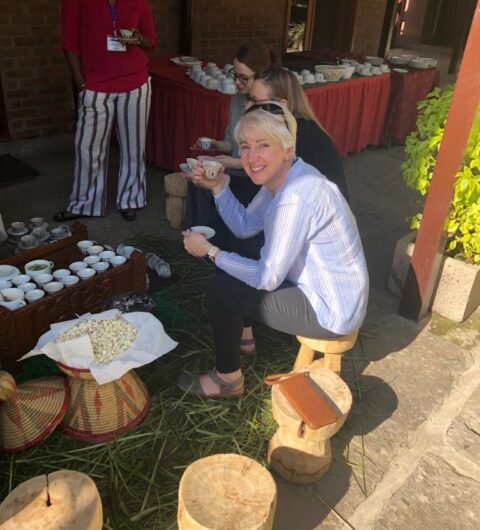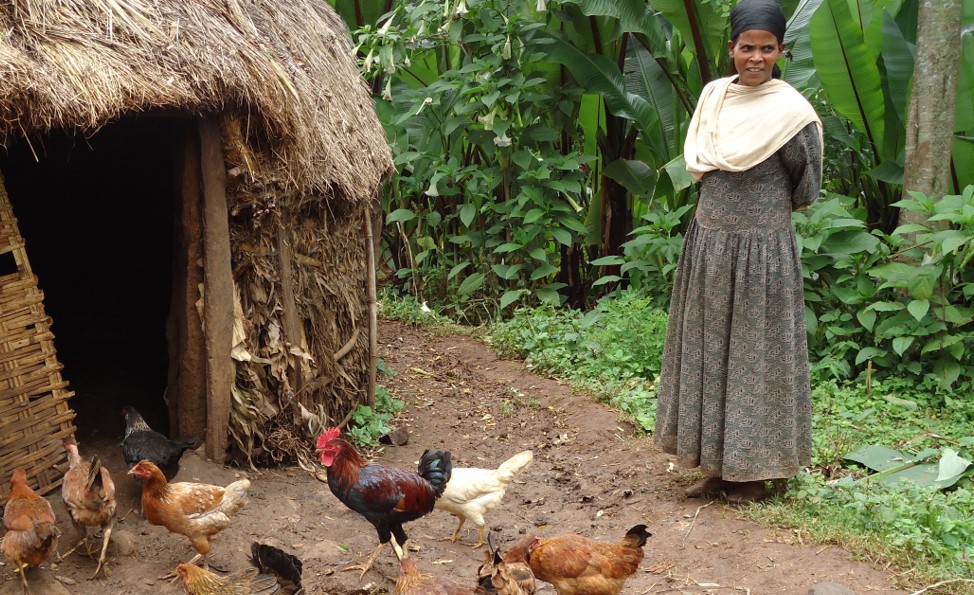
Dr Kellie Watson is one of the programme leaders on the Poultry Genomics Research group at the Centre for Tropical Livestock Genetics and Health (CTLGH) and is based at the Roslin Institute in Edinburgh. Using information from the genetic code of chickens and other commercial bird species, she focuses on improving meat and egg yield in birds, as well as producing birds that will be resistant to harsh environments in sub-Saharan Africa and where communities have limited resources.
through her work, she hopes to make an impact on people’s lives and improve financial security in disadvantaged communities, especially for women.
Kellie was interviewed recently by MSc Science Communication student Laura Zabala Findley and spoke about her research and he challenges she has faced, and also shared her hopes for the future.
What inspired you to become a scientist?
I did my undergraduate degree in agriculture in Aberdeen, in Scotland, and during that time I met my non-academic supervisor. During my Honours year she said “How do you fancy going to Australia?”. There were some opportunities to conduct projects there and there was funding to travel within our department. So I went to Australia to do my Honours project and it was during that time that I decided research is what I wanted to do.
What inspires you to keep going?
Although I have had some changes of track along the way, I enjoy the research work. I enjoy the interactions it brings, working with people, increasing our understanding and having an impact. It is nice to feel that you are making a difference to people’s livelihoods, and to understand the way people manage animals and how beneficial the knowledge we bring to the table is.
Can you describe your work in a nutshell?
I’m a quantitative geneticist and I focus almost predominantly on commercial bird species, including chickens, ducks, guineafowl and quail. I use genetic code information to look into understanding the productivity of birds and improving the potential for increase in terms of the meat and eggs they produce. This work can have an impact on people’s livelihoods.
A lot of my research is focused on working with breeding programmes in the UK and sub-Saharan Africa. I do a lot of collaborative work with countries in sub-Saharan Africa. It’s really rewarding because you can see that there are massive changes to bring about and the potential to help people who don’t have a great income. Being able to pass that on even in just a research context can make big changes to people’s lives.
How does your research benefit women in disadvantaged communities?
In sub-Saharan Africa, a huge proportion of people identify themselves as farmers. While successful farmers might make a good living, resources are very limited in a lot of rural communities. People may have a little bit of land around their home, but they don’t necessarily have resources to spend on livestock.
With chickens, the cost per animal is quite small and the risk associated with one dying is not as high as it would be with other animals. If you’ve got ten chickens and one dies, then you still have another nine chickens. Whereas if you only have one cow and it dies, you’ve lost everything. Keeping chickens is considered a relatively low-risk, low-cost route into farming.

Women don’t often manage cattle, pigs, goats or sheep in those countries, but because chickens are usually raised near the home, they can more easily manage them. So by helping chickens be genetically more resistant to the environment and more productive with regard to meat and eggs under these limited resources, we’re helping women make some money. They can sell eggs or chickens in the market. And this money will probably be spent on their children, ensuring that they are well fed and educated.
The small genetic gains that can be made can be really helpful for improving the nutrition and education of children and the family as a whole. Chickens are considered a route into farming, so if women are extremely successful with chickens, they might move on to other species.
How has the pandemic affected your work?
It’s been hard to adapt. It’s challenging, for example with new people coming into the team and managing people remotely. We’ve had to change the way we work, and try to make an active effort to see people face to face. We’ve coped via Zoom and Teams, but it’s so much better when you can actually sit with people and interact in person.
Research has carried on and there has been some experimental work with the chickens in our facilities. A lot of the funded projects carried on because food security in the UK, and in some cases globally, depends on it. For instance we work a lot with a breeding programme in Nigeria.
And, of course, we continued caring for animals because they don’t stop needing to eat or breed during a pandemic.
What’s your favourite part of the job?
I think it is the collaborative side of it. I really like working with people and coming up with ideas together – getting in a room and bouncing ideas off each other, and seeing how we can use data in novel ways. That’s probably the bit that I like the best.
If you could change one thing about your job, what would you like to be doing?
Well, it would be nice to have easier routes to access funds. I suppose that’s the biggest barrier that researchers have, but it’s inevitable. Being able to be more reactive to research opportunities would be really nice, but it’s not going to happen. Not unless we can grow a money tree.
In what direction would you like to see your research go in the future?
I’d like to see the benefits of the African work materialising. A lot of our work with the breeding programmes in sub-Saharan Africa has been theoretical. It’s been building the foundations, but it would be really nice to see that materialising and seeing birds improving people’s livelihoods in the way they want it to improve.
Working with CTLGH is about implementing what we know in new environments, considering all these challenges in sub-Saharan Africa, whether it’s financial, logistical, even just down having a good, uniform power supply for some of our collaborators to run their hatchery. It’s challenging, but there’s big potential.
What would you be doing if you hadn’t become a scientist?
I would like to have been a builder or worked on doing up houses. I love just getting hands on and doing stuff. When I bought my first house, I built a stable block and made a garden. Maybe I would be a property developer or something like that. I could be a case study in the television show Grand Designs – but not so grand, more Little Designs.
This interview was first published on the Roslin Institute website and is reproduced with their permission
